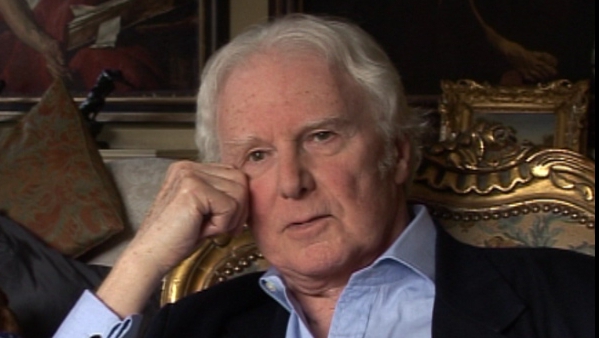NEXT STORY

Moving from the art market to art criticism
RELATED STORIES

NEXT STORY

Moving from the art market to art criticism
RELATED STORIES


|
Views | Duration | |
|---|---|---|---|
| 61. What it means to be an Old Masters drawing expert | 238 | 05:04 | |
| 62. Knowing how to spot a forgery | 259 | 04:06 | |
| 63. Copies, imitations and attribution | 201 | 02:14 | |
| 64. Exposing forgery in art | 289 | 03:05 | |
| 65. Difficult days at Christie's | 253 | 04:45 | |
| 66. A faked van Dyck causes confusion | 256 | 03:29 | |
| 67. Being ill-used by Christie's | 261 | 05:10 | |
| 68. Why I left Christie's | 288 | 05:36 | |
| 69. Moving from the art market to art criticism | 235 | 02:02 | |
| 70. Speaking out in defense of the truth | 274 | 04:10 |


And then there was another similar experience before the end of the year, and which tipped me into actually going to Peter Chance and saying, 'You know, twice since I came to the firm, you have told me that sooner or later I will be a director, and I think the time has come. I’m… you know, I need to take over the drawings, lock, stock and barrel. To do that, I need to be a director. Otherwise, we shall lose more and more. You know, Patrick’s attitude to drawings as a commodity is pretty brutal, but the way he treats people and he treats the rest of the marketplace, no. It won’t do'. Which meant that they had to have a debate at some board meeting a week or two later. And it was generally agreed that it would be a good thing for me to be a director, but it had to be agreed by all the others, all the partners. And Patrick just said, 'We’ve got one homosexual on the board, we don’t need two'.
So David Carritt, who was the other homosexual, was appalled by this. I mean, it is so irrational. And he came and told me immediately what had happened at the board meeting, and said, 'I don’t think you’re going to get through'. And this is what happened. And then I was called in by Peter Chance, the chairman, who told me in rather gentler terms. And I said, 'It’s Patrick, isn’t it?' And he said, 'Yes, I’m afraid so. I can’t budge him'. And so I said, 'Well, in that case, I’ve still quite a lot of work to do on the Devonshire collection. I’d been doing a valuation and a, sort of, inventory. I will leave when I’ve finished it. I won’t ditch you now, I mean, there are two or three months of work still to be done. But when I’ve done that, I’ll go'.
And over the next couple of months, he was constantly poking his head around the door and saying, 'Come and have lunch'. And always the conversation was, 'You don’t really have to go. You don’t really have to go. We might manage something in two or three years'. To which my answer was, 'No, I need it now. I can’t go on in this humiliating position. So you either have to reverse Patrick’s view of it, or I have to go. I cannot continue to work under him'.
And so Patrick wouldn’t budge, so I left. And that’s how my Christie career… otherwise I’d have been in Christie’s forever, you know. I was astonishingly loyal to that firm. It was… you know, it was what I did, as it were, by then. It… I couldn’t really think of going anywhere else. What I discovered, of course, when I left Christie’s, was that the academic field was closed to me, because at that… it doesn’t work like it now, but in those days, if you had worked for a dealer or an auction house, that was the end of you as far as academe was concerned. You couldn’t go into it. Your knowledge was soiled by Mammon, which is a totally ridiculous attitude, because if you look at people nowadays who are in the drawings field, like Noël Annesley at Christie’s, my successor. Noël is at least as much a scholar as he is an auctioneer.
And that is precisely what I was, though nobody recognised it. Nobody recognised the scholarship, but the scholarship was there. And no museum man ever has the opportunity for testing his knowledge and his connoisseurship that the man in the auction house has, because that sort of material just doesn’t come his way. So the range of knowledge that I had, as well as the depth, was hugely important. And it’s really been wasted, I mean, apart from finding drawings for the museums that took me on board as an advisor and helping to form one really significant private collection, my knowledge has been wasted. Five years later, it would have been very different.
Born in England, Brian Sewell (1931-2015) was considered to be one of Britain’s most prominent and outspoken art critics. He was educated at the Courtauld Institute of Art and subsequently became an art critic for the London Evening Standard; he received numerous awards for his work in journalism. Sewell also presented several television documentaries, including an arts travelogue called The Naked Pilgrim in 2003. He talked candidly about the prejudice he endured because of his sexuality.
Title: Why I left Christie's
Listeners: Christopher Sykes
Christopher Sykes is an independent documentary producer who has made a number of films about science and scientists for BBC TV, Channel Four, and PBS.
Tags: Christie's, Patrick Lindsay, Hugh David Graham Carritt, Noël Annesley, Peter Chance
Duration: 5 minutes, 36 seconds
Date story recorded: April 2013
Date story went live: 04 July 2013